New Ukes on the Block
In business just 10 years, KoAloha is the ukulele of choice for local stars

By .(JavaScript must be enabled to view this email address)
E-mail this story | Print this page | Archive | RSS
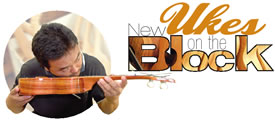
This year marks the 10th anniversary for KoAloha, a young but highly reputable ukulele company known for its fine sound, quality and design.
Tucked in a small, crowded warehouse in Kalihi, the creation of a KoAloha ukulele begins with the Okami family and its passion for this century-old instrument.
“Reaching 10 years, we’re very happy about that,” says Alan Okami, vice president of KoAloha. “(The ukulele industry) is very competitive, so we do have to win our customers over. It’s a choice they make, and it is very special to us when they choose a KoAloha.
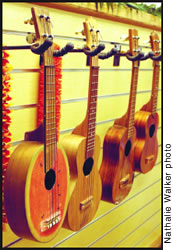
KoAloha ukes
“Being the builders of this instrument, it’s really an indescribable feeling. It’s kind of warm and fuzzy, and just absolutely incredible. Often times, it’s a birthday gift, a graduation present, it’s something people save up for. It’s also very personal and very much involved. When we get to meet our customers and we get to see the affect it has on people, and when we hear of stories of the customer who sleeps with the ukulele on his pillow because the first thing he wants to do is wake up and play his ukulele, it really makes us feel special. It makes you feel like what you’re doing, it counts.”
KoAloha may be the new ukes on the block, but its family of stars are of great eminence. 2005 Na Hoku Hano Hano nominees Brittni Paiva, Raiatea Helm, Melveen Leed, Herb Ohta Jr., David Kamakahi and Daniel Ho strum the strings of KoAloha.
And Roy Sakuma, Hawaii’s premier ukulele teacher, “commissioned and consulted extensively” in the development of these instruments.
“We’re just really blessed,” says Alan. “Not only do (these musicians) have that notoriety, but they are all really nice people.
“Early on and even to this day, we have had comparisons with the Kamaka, and we’re actually honored that we would even be compared with them as they’re the granddaddies of ukulele. Whenever you talk about the ukulele, Kamaka is bound to surface. So for us, to have been in business for just 10 years, and to be regarded in the same category as them, it’s really nice.”
KoAloha produces in excess of 200 ukuleles a month. The process starts with selection of the wood, and then drying it in a kiln for five to 10 weeks.
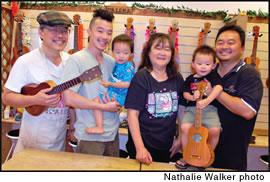
The Okami ohana — (from left) dad Alvin, Paul
with son Noah, mom Patricia, Egan with dad Alan
The dried lumber is then taken through various separations per usage and the milling process begins. Some pieces will be machined while other pieces are veneered into thin slices.
From there, the wood to be used as the sides of the ukulele is soaked in heated water, taken out to be bent, and placed around a mold to set the shape. The front and back pieces are then attached.
“One thing that makes our ukuleles unique is that we use a unibrace which makes it really strong,” says Paul Okami. “Nobody uses a single piece brace. We used to get ukuleles to repair, and it doesn’t matter how well it’s made, it’s just not as strong.”
Next, excess wood from the front and back pieces is trimmed off, the neck attached, then the fret board and bridge glued on.
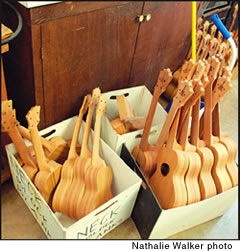
Ukuleles ready to have their bridges mounted
Then it’s time for sanding and filing, which is all done by hand, before going to the spray room for that glossy finish.
After that, the ukuleles go through a final inspection before being strung, tuned and readied for play.
“We dry and bend to make several hundred ukuleles,” explains Alan. “So it’s hard to say exactly how long it takes us to make an ukulele. We could easily finish one in a day. But, of course, we don’t only make one a day. The ones we do regularly are production mode.”
KoAloha was founded by Alvin Okami, a man of many talents — inventor, composer, arranger, singer, accomplished oboist, industrial designer and graphic designer.
He was a first chair oboe soloist with the Royal Hawaiian Band for 10 years, and formed Commercial Music Hawaii where he wrote jingles for on-air commercials in radio and television, including tunes for Woolworth and Koko Marina Shopping Center.
After that, he took a 15- year break from music and started Precision Plastics Hawaii, where he invented numerous household products including the Spam musubi mold, acrylic drain trays and the popular toothpaste Tube Press squeezer.
Then in 1994, an old friend named Herb Ohta Sr. suggested to him the idea of crafting a miniature ukulele. Alvin thought about it, and then took the idea to another level, making a miniature ukulele (measuring no more than 5 1/2 inches in length) that was playable and tunable.
“It was really neat, if you could play it,” says Alan. “It’s so small, so it’s hard to play, but it’s playable.”
From there, KoAloha was born, eventually growing to a line of regular-sized ukuleles. “Around 1997, the demand for ukuleles was so strong that we converted entirely to making ukulele,” recalls Alan. “Now, our ukuleles are in most music stores islandwide, and we also service most ukulele specialty shops. We also have a distributor in Japan, and we have some customers on the Mainland.”
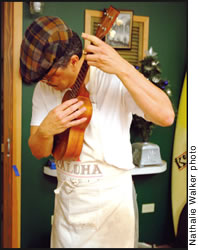
Alvin Okami checks the tune of one
of his ukuleles
A KoAloha ukulele starts in price from mid-$300 to the tenor size at $700- $800. KoAloha currently offers ukuleles of soprano/standard, concert and tenor size.
They also recently debuted the KoAloha D6, a request by Daniel Ho, featuring an ukulele that plays like a guitar.
“It’s an ukulele with six strings that is not like a traditional sixstring ukulele,” explains Alan. “A traditional six-string ukulele has double strings at the C and A string, whereas our D6 has six individual strings. Our D6 is going to be strung from the top going A, D, G, C, E, A. It’s like a little mini guitar, but we still call it an ukulele because it’s tuned like an ukulele.”
The KoAloha D-6 will be released this week, followed by the traditional six-string tenor toward the end of July.
“There’s going to be another release that we hope to introduce in the summer,” adds Alan. “It’s obviously going to be an ukulele, but we want to make it a surprise. The only thing I can say about it is that the new release will probably make more people happy.”
KoAloha ukuleles feature a more contemporary design, with a trademark five point headstock. Traditional ukuleles have three points.
The ukuleles are made from a variety of Hawaiian koa, mahogany or ebony.
“We have a slogan that we’re going to be implementing — KoAloha is built from the sound up,” says Alan. “If it doesn’t sound good, we probably wouldn’t sell it. Sound is our emphasis.”
KoAloha is a true example of a family-run business with mom Patricia Okami as president, dad Alvin and son Alan as vice presidents, son Paul as shop supervisor and manager of custom orders, along with a staff of five others.
KoAloha also offers tours (in English and Japanese) of their ukulele plant.
“What’s real nice is that for the schoolchildren we don’t charge anything,” says Alan. “We bring them in here, and ask a special guest to come in and play the ukulele. It’s an active tour, so we also have a special activity for them.”
The Okamis are committed to perfection. They share a passion for the ukulele, an instrument that they say has become an icon of Hawaii, and believe in their products 100 percent.
“We feel that the purchase of an ukulele is a big investment,” says Alan. “Not too many people I know spend $300 to $800 every day, so we like to keep in mind that this may very well be someone’s first ukulele and they had to save money for this.
“One of the things that makes us unique is our warranty. It covers most things, other than wear and tear. For example, if something happens to your ukulele because of the change of climate — sometimes the weather can separate the seams on any string instrument — we do not run away from supporting our product. Our warranty is almost unlimited. The slogan/desire for our warranty we are developing is ‘Better Than The Weather.’”
The history of the ukulele dates back to 1879 when a Portuguese master craftsman named Manuel Nunes arrived in the Hawaiian Islands with Joao Fernandes and Augustine Dias, and together created the ukulele modeled after their native fourstringed guitar known as the braguinha.
The ukulele, which translates to “jumping fleas,” is a must-have for almost all local musicians, and a popular instrument at local gatherings for all occasions.
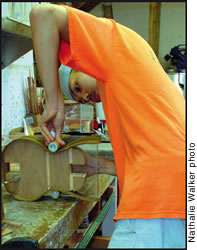
Benjamin Sacro shapes an ukulele
before it’s glued together
“There’s a really nice side of what the ukulele can bring to people,” adds Alan. “Generally speaking, it lends itself to gettogethers and parties with friends and relatives. It has a tendency to bring people together.
“My goal for us is to get to a point where we could be absolutely philanthropic with our ukuleles. My family shares a lot of this, and that’s the fuel of my fire.”
Page 1 of 1 pages for this story
E-mail this story | Print this page | Comments (0) | Archive | RSS
Most Recent Comment(s):
Commenting is not available in this weblog entry.







